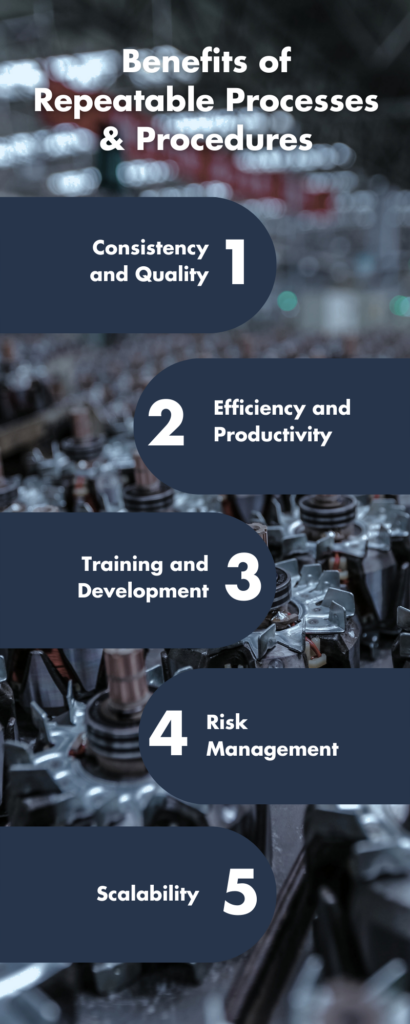Potential buyers know that a large component of a business’s value lies in its ability to run itself – to keep delivering quality products and services regardless of who the owner is. (Hence the need for owners to make themselves redundant before exiting.)
Good managers know that their people are most efficient when they have clear and repeatable steps to follow. These Standard Operating Procedures (SOPs) are essential when training and onboarding new employees, reduce decision fatigue, eliminate bottlenecks, and ensure that the work of the company continues no matter who is in any given role.
What You Risk Without Standard Operating Procedures
If you’re still managing everything with all processes and procedures in your head and not written down, you are making your work more difficult, and you are exposing your business to risk.
What if you’re suddenly incapacitated for some reason? Whether your technology fails while working remotely, you’re injured, or a travel fiasco keeps you from the facility, you cannot afford to keep these details in your head.
We find that businesses lacking effective management often also lack SOPs. Consequences are costly. Lack of SOPs not only restricts profitability but also growth
Benefits of Implementing Standard Operating Procedures
Additional benefits of identifying, documenting, and following standard operating procedures include:
Consistency and quality: Taking time to create SOPs ensures that your teams perform their work consistently and to a high level of quality. This is essential for building customer trust and loyalty, which are critical factors in driving growth.
Efficiency and productivity: SOPs improve efficiency and productivity by eliminating redundancies, reducing errors, and minimizing waste. This enables your business to produce more goods or services, reach more customers, and achieve faster growth.
Training and development: Documented processes and procedures are excellent training tools for new employees. They provide a clear roadmap for how to perform work, reducing the time and resources needed for training and development. This can help a business scale more quickly by quickly onboarding new employees and building a strong team.
Risk management: SOPs help you manage risk by ensuring that all work is performed in compliance with regulations and laws. They also provide a framework for identifying and addressing potential risks, such as equipment failure or data breaches, which can be critical in ensuring business continuity and growth.
Scalability: As a business grows, it becomes more challenging to manage and control all aspects of the business. Documented SOPs provide a framework that helps the business maintain consistency, quality, and efficiency as it expands.

Maintaining Effective Standard Operating Procedures
If you have developed SOPs, make a practice of evaluating them periodically. They may need updating as you work with them.
Disorganized Processes: Poorly defined processes can create hiccups when trying to scale. Each step will need further clarification and development to achieve scalable results at an efficient rate. Take the time to document all your business’s processes with as much detail as possible. This way everyone understands their role in achieving the desired outcome.
Rigid Policies & Procedures: Rigid policies and procedures that don’t allow room for flexibility or adaptation could hinder your efforts to scale. Most businesses will need some degree of customization or adjusting depending on your specific market conditions or customer demands at any given time. Re-evaluate your existing policies regularly to ensure they don’t become roadblocks when attempting expansion!
Read more articles on our blog, Capital Concepts Insights. We share stories and perspective on building successful businesses and planning successful exits.
Related Articles
Build & Beware: What it might cost you to sell your business
You Just Sold Your Business for Millions – So Why Isn’t That in Your Bank Account? The papers are signed. The deal is closed. After years of hard work, you’re ready to celebrate your big payday. But as you finalize accounts and tie up loose ends, you realize the...
Eight Ways to Exit Your Business
When it comes to exiting a business, most people assume there is only one way out: sale. But actually, there are 8 distinct ways to exit a business. Before considering your next move, it’s crucial that you understand each of these options to determine which is best...
Navigating Payroll Taxes
Tax deadlines are creeping up, demanding your attention and time. You’re still busy making sure things run smoothly day-to-day; filing business taxes can feel like the last complication you want to deal with.
Cashflow: Why you need it, and how to have money in the bank for your next busy season
Gain insights from industry experiences and expert guidance to optimize your financial strategies.
If You Don’t Have a Leadership Transition Plan, Your Exit Could Fail
If you Don’t Have a Leadership Transition Plan, Your Exit Could Fail
Get A Grip Roundtable
Does This Sound Familiar? Your business isn't as efficient or profitable as you'd like. You’re putting in the hours but not seeing the results you want. You’re stuck. You know your business has potential, but you're unsure how to take it to the next level. You’re...
Need Fresh Eyes On Your Business?
We offer complementary consultations to help you identify the areas where you could most quickly and easily improve your business’s performance, value, and profitability. Request one today.

